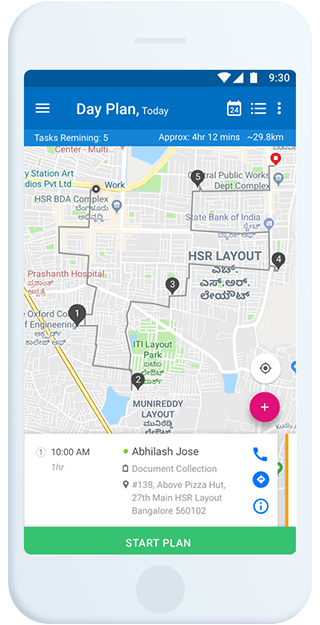Getting your sales team organized is one of the major steps in improving the efficiency of your business. It’s not just a matter of telling them what to do, it’s more a matter of making sure they do what they are meant to be doing. That’s why more businesses are adopting a daily sales app.

By using an app, company-wide, you’ll be able to stay in contact no matter if they are office-based or out in the field. You’ll be able to keep them on track and find out when they are deviating or falling behind – it’s the sensible way to optimize your sales team, one day at a time.
What’s it for?
Even for managers, it is not uncommon to be unaware of exactly what your sales team is doing. This isn’t necessarily a bad thing, as you generally need to know the outcomes, but if there are certain tasks the team (or individuals) need to perform, it’s worth keeping on top of.
An app that is used daily by the sales team can generate a to-do list or calendar for them to follow. There may be team goals, there may be individual goals, and there will certainly be tasks that need to be completed.

The team can add in their own tasks, and the managers can add tasks too – these can simply be lists of people to call, messages to send, etc. Having the list in front of the sales team members will make it more likely that the jobs get done.
Tracking your sales team
The daily sales app runs on a mobile device, most likely a phone, and so can be used to keep track of phone calls (inbound and outbound) and messages for updating the company CRM system. The CRM will be directly accessible from the device itself, so should a salesperson need information about a customer, they can access it quickly.
Furthermore, with the integration with GPS, keeping a check on your team members when they are heading to a meeting has never been easier. You’ll get live updates of where they are, and they’ll get notifications of when and where the next meeting will be – along with directions to get them there on time.
You won’t have to call them to find out where they are, and they can also be checked in automatically when they arrive, so you can be certain everything is under control. Plus, when they leave, they can update the CRM with their meeting notes. This means the very latest information is always available to anyone dealing with the customer.
Related:
Automating reports with a daily sales app
The app also allows updating of sales figures so the team members can keep the accounts department fully up to date. One thing that often causes tension is the need for sales reports to be sent to sales team managers – once the data is entered into the app, the sales reports can be automatically generated and sent out whenever necessary.
The sales team member doesn’t have to remember to do it, it takes no time, and the information is exactly where the manager needs it to be.
Integrating with a larger automated system
While being able to schedule tasks and meeting for members of your team may seem like automation to some managers, the truth is that a fully automated system can relieve a lot of the pressure that the team may be facing.
Repetitive tasks are ideally suited to automation (with report generation being a prime example), but how many times will a visitor to your website want more information about a product? It’s just a simple email that is needed in response, but if there are 10, or 20, or 100 people asking for information at the same time, there can be a significant delay.
Using automation to respond to these requests ensures that the customers are well-served in a timely manner and gives opportunity to link into the CRM and build a profile of the individual before the sales team comes into contact with them.
This gives the sales team an advantage as they already have some background on the needs of the lead. Better yet, links within the information email can suggest different products and services, and how the lead responds to these offerings can build an even more complete picture of what they need to solve their problems.
This integrates the entire sales system with the app with information being passed back and forth where needed. If you had the ability to know what your lead wanted before they knew themselves, wouldn’t you jump at the chance?

Why sales team love it
A sales team has a single goal of making sales – that’s obvious. But the path to making a sale can be convoluted and not everyone on the team may be clear about what they need to do in order to be effective.

A daily sales app will help to keep these team members on track with a clear plan of what to do next with tasks and schedules automatically arranged. It’s simply a matter of following through, step by step.
With the integration to the CRM the app actually reduces the workload required to make a sale. The first few steps may be taken care of by the automation facilities, and when a member of the team speaks or messages the lead there won’t be any need to start with the basics – that information has already been established.
Perhaps best of all, even when every meeting has been completed and every task checked off, is the ability for the app to present the next best action for the salesperson to take. Using criteria specific to your business, each person in the CRM can be scored for their quality as a lead – a higher score means they are the most likely to convert into a paying customer.
The sales team can start by concentrating on these leads and ironing out their last few issues, making it much easier to make sales when needed.
If your sales team isn’t using a daily sales app, you could be missing out on a large amount of revenue.







